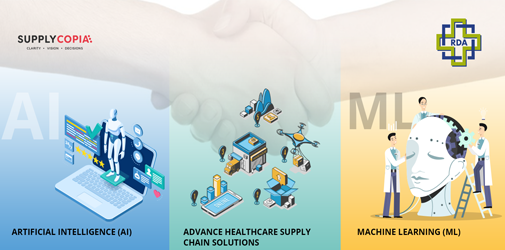ASHOK MUTTIN | DECEMBER 23, 2020
Healthcare Supply Chain Amazoned
Predicted in Feb 2015 that Amazon is quietly putting together the foundation necessary to disrupt the healthcare supply chain (that’s the only reason Amazon enters an industry). What is the motivation for Amazon to target the healthcare industry? When we look at all those industries that Amazon has already disrupted, they all have some or all of the
following in common:
1. High margins
2. Complex distribution arrangements and logistics
3. Vested interests, with a few profiting at the expense of many
4. Complicated, multi-tiered contracts, pricing, and sales strategies
5. Questionable relationships, special interests, and a general sense of confusion
All of which sounds just like the healthcare supply chain.
Basically, Jeff Bezos seems to be targeting a whole bunch of organizations such as national group purchasing organizations (GPOs), dealers, distributors, manufacturers, and management consulting companies.
Let’s look at the potential effect on each of these organizations:
National group purchasing organizations (GPOs)- There have been suggestions made by many people that Amazon could partner with them, but I have not come up with one single reason for this partnership. Why partner with the people you are trying to dis-intermediate? Would Amazon have partnered with Borders or Netflix with Blockbuster? If Amazon needs to understand the underlying contracting structure and inner workings of the GPOs, it’s easier for them to hire those guys away from the GPOs (Amazon has already begun this process anyway). Add to this what if Amazon lobbies Congress and becomes successful in rescinding the special privileges given to the GPO’s? This new administration has shown a willingness to take on issues head-on and this may just be one of the first things that Tom Price takes on.
Distributors: Healthcare supply chain apart from the large, well-known, national distributors is still fairly fragmented; this provides a huge opportunity of consolidation. With its legendary customer support, Amazon Prime, and now supplemented by drone technology, Amazon could revolutionize not only distribution but also inventory management, and significantly reduce costs for providers.
Manufacturers: Well, if you are Medtronic, J&J, Smith & Nephew, Stryker, or other highly specialized products and R&D companies then there is probably nothing to worry about (as yet). If you are a small to mid-size consumable and supplies manufacturer, then there is plenty to worry about. There is going to be significant consolidation in the market and larger players will acquire additional scale, just to remain in the business and be price competitive. Add to this the aggressive manufacturers from China who have been delivering smaller UOMs directly to health systems and IDNs.
Healthcare management consulting companies: Including the big 4 (or 5 or 6, depending on whichever day of the month you are looking at), there are literally hundreds of consulting companies providing various strategic and supply chain consulting services to providers. These companies have unfortunately not invested in technology to create a niche for themselves and continue to provide the same services over and over again. If Amazon succeeds in slashing prices significantly (think 15-20% immediately) then there is a lot less inclination for the heads of the supply chain or the CFOs to hire these services for cost reduction purposes. Let’s be clear, we are not proposing that any of these organizations will entirely disappear or the disruption will happen overnight, but there is surely a redrawing of the map underway. While we are not sure if any of the recent news about GHX being on the block or other well-known companies “evaluating strategic options” is a direct result of the Amazon effect, these developments surely are significant by themselves.
On the flip side, Amazon has not necessarily been successful in every industry it enters: ***
1.Amazon fire phone- Amazon wrote off more than $170 million
2. Amazon Destinations- This venture lasted even shorter than the phone and Amazon shut it down
3. Amazon Local- Very similar to Groupon and Livingsocial- After a valiant attempt, it looks like this was shut down, too
4. Amazon local register- Shut down after a year in business
5. Music importer- Met the same fate and shut down Unlike B2C, the healthcare supply chain has its complexities with reference to pricing, payment mechanisms, payment terms and conditions, integration of the order with ERP and MMIS, auto replenishments, maintaining PAR levels, physician preference items management, etc. While this sounds like a daunting task and would scare away the faint of heart, we have to remember we are looking at the most ambitious, long-term player in the history of the eCommerce industry. To circumvent some of these issues, Amazon could as well acquire GHX, a bunch of consulting companies, and smaller manufacturers and still have plenty left in the bank to carry on its disintermediation and disruption.
Our conclusion? 2017 is going to be quite interesting.
The author is the founder and CEO of SupplyCopia(www.supplycopia.com), a marketplace for the healthcare supply chain. Designed with big data, analytics, and cloud as a foundation, the platform is designed to help providers transform their operations and suppliers to generate new revenues.
Sources: *- Amazoned-Is a word submitted by “merlin3212” to Collins Dictionary to indicate the threat posed by Amazon to traditional brick and mortar industries *** Source is an article published in Street. https://www.thestreet.com/story/13364106/3/here-are-10-of-amazon-s-biggest-failures.html
More from SupplyCopia



 ALL Solutions
ALL Solutions 
